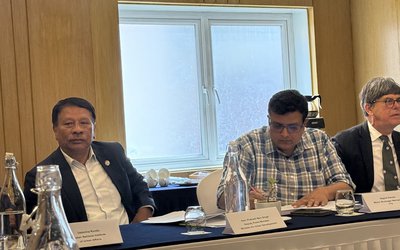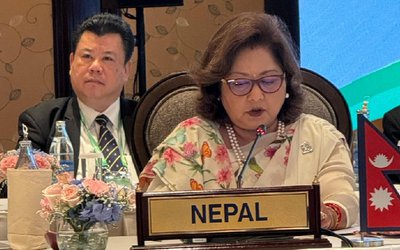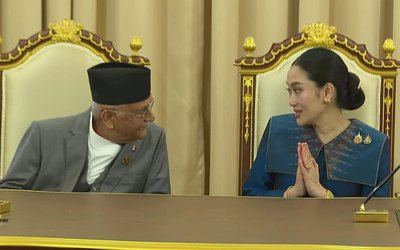
At the time of this writing, a letter dated October 27, 2015, undersigned by the then Army Chief Rajendra Chhetri, addressing the US government’s State Partnership Program is widely circulated in the Nepal media outlets. The authenticity of the letter is now confirmed by the current Army Chief Prabhu Ram Sharma. When the letter was sent to the US, the Nepal government was headed by the prime minister KP Sharma Oli, who is the current leader of the Nepal Communist Party United Marxist-Leninists.
The said letter was written seeking for partnership with the US for “long-term, enduring and mutually beneficial security relationships to exchange military skills and experience, share defense knowledge, enhance partnership capacity and further mutual security cooperation.” The content of the letter, especially ‘security relations’ and ‘security cooperation, is being considered by many as contrary to Nepal’s non-aligned foreign policy principle.
The Swedish rationale for joining North Atlantic Treaty Organization (Nato) and Nepal’s presumed need to keep its non-alignment intact are relevant issues for the current discussion.
With the ongoing Russian military attack on Ukraine on February 24, 2022, and the chain of events since then along with Finland’s decision on May 12, 2022, the Swedish Parliament on May 16, 2022, made an unprecedented decision to join nato. Sweden and Finland have already submitted their applications to Nato headquarters. The decision is being described by the Western media outlets as ‘historical and as a‘ radical shift’ from centuries-long neutrality to the military alliance, although the two countries since the 1990s have been engaged in Nato through the ’partnership for peace’ agreement.
At the outset, it can be said that the two countries will now be 'partners of war' under Nato protecting themselves as well as other Nato members. According to Article 5 of the Nato Treaty, "an attack on one member is considered an attack on all." Nato claims to be a collective defensive military organization, although Nato can be used for both defensive and offensive purposes. After all, the terms 'defensive' and 'offensive' have a double meaning in any war situation, e.g., whether the 2003 US illegal invasion of Iraq was defensive or aggressive (whether it was a provoked or unprovoked war) is still being debated. The very logic of international law that 'two mistakes don’t make a right, whether it relates to US or Russia or any other state, needs to be applied.
Russian President Vladimir Putin’s invasion of Ukraine has led to indiscriminately mass murder in Ukraine as did the US in Iraq. These are blatant violations of the principle of non-intervention. In addition, the Russian aggression being an invasion made by a permanent UN Security Council member also damages the UN system that evolved after the second world war, in effect creating a lawless world. The five permanent members of the UN Security Council, who are responsible for the maintenance of peace and security, have failed in their responsibilities. Weapons of mass destruction and military alliances seem normalized. Voices for nuclear disarmament are being overshadowed by militarism, arms race, and nuclear terror.
Putin has been instrumental in creating both physical and mental terror in Europe in general, and in Scandinavia in particular. The invasion has whipped up public opinion in Finland and Sweden for Nato membership. Before the war, Finland’s public opinion in favor of Nato was less than 20 percent which increased to 76 percent at the time Finland officially decided to join Nato. Similarly, in Sweden, the opinion increased from an initial 22 percent to 53 percent at the time when the government decided to enter Nato.
It is reasonable that people unite in times of crisis. Some people may be happy with the decision to join Nato, but others are mourning the passing of neutrality. Everyone, however, seems to be realizing the fact that life will never be the same again in Scandinavia. The decision also gives an opportunity to reflect on whether Sweden’s neutrality is hasbeen genuine in the past, especially during the second world-war, giving German Nazi troops passage through the country towards Norway. Swedish arms sales and Swedish alignment with the US after the second world-warfare also subjects for reflection on Swedish foreign policy and neutrality in the past.
Some tenets of Sweden’s foreign policy
Sweden has been a successfully neutral state for about two hundred years or more, keeping itself out of the first and second world wars. The Swedish neutrality image reached its height at one point being known as a moral superpower. Under the leadership of Prime Minister Olof Palme, especially in the 1970s, Sweden was well-known for its commitments to democracy, human rights, peaceful settlement of disputes, and opposing arms race in demanding nuclear disarmament. Palme’s opponents have been advocating for joining the Nato alliance for a long time. Now, it is Palme’s own Social Democratic Party that has changed the course of Swedish neutrality.
The current Swedish leadership may wish to keep its image of neutrality and continue its basic tenets of foreign policy. Practically, however, Sweden is transiting from its advocacy for disarmament toward a strategic arms race, and from a peaceful settlement of disputes toward military use of force. As a neutral state, Sweden had been a fellow partner with the non-alignment movement advanced by newly independent states after the second world war. Now entering the Nato umbrella, Sweden and Finland will have to be the actors of war not only for its own defense but for all Nato members.
Sweden may face some initial difficulties in convincing the world public at large about leaving its long-adhered policy of nuclear disarmament. Sweden - as well as Finland - will have to be dependent on nuclear arms parity between US and Russia (e.g., the number of intercontinental ballistic missiles, which according to some reports has 665 and Russia 760).In addition, as Nato members, Sweden and Finland would be required to build not only more conventional arms, but perhaps also nuclear arms, not to mention the increase their military budgets. Although necessary it will be difficult for Sweden to be a trustworthy voice to the world audience regarding the need for nuclear disarmament as it used to be before. These are important issues needed to be studied strategically but is outside the scope of this writing. Only a few, but important, rationale and issues involving the historic decision to join Nato are addressed here.
Rationale
Firstly, the rationale that ’extraordinary situation and extraordinary measures are presented as a genesis of the Swedish decision, although Sweden is not in a war situation yet. Without public referendum and/or wider public debate, the ruling Social Democratic and opposition Moderate parties decided to apply for Nato membership along with Center, Liberal and Christian Democrat parties, including extreme right-wing Sweden Democrats. Out of the eight parties in the Swedish parliament, only the Left and Green parties oppose to join the military alliance.
Secondly, the rationale that there is ’no viable alternative to Nato’, is imperative to take the decision. This is unique, pointing to the perception of all other means of defense having come to an end, including UN avenues of peaceful settlement of dispute and co-existence that Sweden used to champion. It seems, that working for peace in Ukraine through talk and de-escalation is an impossible task.
Thirdly, yet another rationale is that we do not want to be ’intimidated' by Putin and his bullying to neighboring countries. And, therefore, it became necessary to show Putin that we make decisions on our own. This argument may have helped the rise of public opinion toward Nato. An additional argument is that the decision will not only strengthen the national security of the two countries, but also the collective security of Nato members. It reads as a reasonable argument. As we look at the other side of the argument though, it should also be acknowledged that Putin’s aggression put pressure on Sweden and Finland to join Nato.
Fourthly, that Sweden will not let nuclear weapon installations on Swedish ground and not let Nato troops being based in its territory, is yet another rationale; but the question stands, how the two countries could defend themselves against Russian attacks without having nuclear arms for themselves - or without Nato’s nuclear arms in their territories in a worst-case scenario.
Finally, Sweden’s and Finland’s entry into Natocould be added value to Nato, both countries having high-quality military technology. This is a reasonable argument. At the same time, Sweden will have to exchange its long-earned neutral image and siding with a military alliance, perhaps not by choice but by compulsion. In this context, Sweden’s liberal, peaceful, and the democratic image is at stake. As the tension rises, Sweden and Finland would need to rethink building nuclear weapon capability. If Sweden and Finland choose to develop nuclear weapons, Germany and Japan may consider rearming themselves. What would happen if Japan and Germany upgraded themselves into nuclear-weapon powers? What kind of world would it be like?
The nuclear terror era has begun
The world has entered an era of nuclear-weapon terror. Russia is threatening to use nuclear weapons. One can only guess that the US and other nuclear-weapon powers are closely watching Russian threats. Nobody knows Putin’s next move. He has warned to put nuclear weapons in Kaliningrad by the Baltic sea if Sweden and Finland join Nato. It may be Europe’s ‘Cuban missile crisis’- somewhat similar to when in1962 the two superpowers of the US and the Soviet Union were having a face-to-face nuclear confrontation. Ukraine is also being called a new ’Afghanistan for Europe’.
Putin is being described as a gambler and a calculating risk-taker by some. His physical health and mental psychology are being discussed in media outlets. Whatever is true, Putin’s invasion of Ukraine has given a new lease of life to the declining US empire; the former US President Donald Trump had openly declared that Nato was obsolete. Nato leaders and strategic analysts may be studying possible consequences to Nato itself if the US elects a Trumpian kind of president again in the future.
Neutrality as a non-military target
There are countries in Europe that have not shifted their opinion due to Putin’s war on Ukraine, e.g., Ireland remaining neutral. Neutral states are supposed to be non-military targets during wars according to the long-established practice of international law. The US carpet bombing of neutral Cambodia during the Vietnam war was an obvious violation of international law. The war was neither declared by the US Congress nor had any legal basis. It was the aggression against Vietnam guided by political ideology and sphere of influence. The only legal basis for the American war against North Vietnam was said to be based on the so-called self-defense of South Vietnam. The logic of Cambodia was that the then Cambodian head of state, Prince Norodom Sihanouk appeared more friendly to the communists than to the Americans. The US also invoked ‘hot pursuit’ or chasing or catching Vietnamese fighters in the territory of Cambodia. But no convincing evidence was ever presented.
Is Putin going to end the war without the neutrality of Ukraine?
It is not only Nato members but also neutral countries like Switzerland that are supplying arms to Ukraine. At the same time, Nato leaders are trying to avoid direct confrontation between Nato and the Russian military. Ukraine’s President Volodymyr Zelensky has asked Nato to establish a ‘no-fly zone’ over Ukraine which has been declined by Nato. Regime change in Russia is expected but not argued for by Nato. The Nato leaders must realize that Russia is not Afghanistan, Libya, and Iraq where regimes were changed by wars. How will Nato manage nuclear weapons after a Russian defeat or Putin’s regime change? Will a new regime in Russia be less nationalistic than the current one?
Nearly one month after the Russian aggression, Ukraine’s President Zelensky offered a declaration of neutrality to Russia for peace ‘without delay.’ Zelensky’s offer for peace includes ‘security guarantees and neutrality, non-nuclear status’. No further discussion has been made on this proposal.
Turkey’s opposition
Sweden is determined to join Nato, sooner or later, despite the media reports that Turkey is opposing Finland and Sweden to enter Nato (a unanimous decision of all Nato members is required for new member admission). Who knows if Turkey is bargaining with the US for the F-16 fighter aircraft delivery, indirectly working with the Russians or both? Both Sweden and Finland are being accused by Turkey of sheltering the Kurdistan Workers' Party, which is resisting Turkish domination in the Kurdistan region. Some reports suggest that Putin is ‘secretly controlling Hungary and Turkey to stop the West in its tracks.’ Hungary and Turkey have a different understanding of the very idea of democracy, which poses new challenges for Sweden and Finland having to deal with. Above all, EU member states have not decided on the long-standing Turkish application for EU membership. Some Nato leaders have called the fight for Ukraine as a fight between democracy and dictatorship. The world’s well-known war strategist Henry Kissinger suggests that international politics has entered a ‘totally new era’ and it is strategically unwise to describe the Western support to Ukraine as a strategy to protect Ukrainian democracy against the Russian dictatorship.
Nepal's non-aligned foreign policy
To be neutral is to stay out of the war regardless of right or wrong. Non-alignment means taking non-military measures to prevent war. Nepal has taken a just stand against the Russian invasion of Ukraine. China and India have not opposed Russia in the Ukraine war. Nepal's foreign policy has long been based on the principle of non-alignment. For example, since the mid-1950s, Nepal joined forces with the Non-Aligned Movement in opposition to Nato and Warsaw Pact. Nepal is the first Asian nation to recognize Israel, and at the same time constantly supports the Palestinian people's right to self-determination. Nepal had taken a stand against apartheid in South Africa at a time when the US and Britain were supporting apartheid. Nepal opposed the Vietnam War, in relation to the US, and likewise, Nepal took a stand against the US military invasion of Grenada.
Nepal opposed the Soviet invasion of Hungary and Czechoslovakia. Nepal also opposed the Soviet Union's invasion of Afghanistan. Nepal’s representative to the UN, Rishikesh Shah took a stand at the UN against Soviet leader Khrushchev representing history. As Nepal’s envoy, Shah opposed the Soviet invasion of Hungary and Czechoslovakia even without instructions from the Nepalese government. At the time when Britain, France and Israel invaded Egypt to control the Suez Canal, the Soviet Union sided with Egypt in the Suez Canal conflict, Shah protested the Anglo-French invasion. The United States threatened economic sanctions on Britain, France, and Israel. This was the cornerstone of Nepal's non-alignment. The Nepali government did not like what Shah did at the UN. He was also criticized by India. During his short tenure as ambassador to the United Nations, Shah has contributed to the growth of Nepal's non-aligned foreign policy. Time Magazine (October 24, 1960) writes that "Rishikesh Shah, the most influential diplomat in Nepal to make" non-aligned foreign policy respectable”.
Despite its dysfunctional democracy and lack of economic development, Nepal's role in the UN peacekeeping operations is significant (Nepalese diplomats need to tell the world about it). The most important example is Nepal's non-alignment in the Sino-Indian war of 1962.
Because of geographical proximity with Russia and having utilized the described rationale earlier lead Sweden and Finland ended neutrality and non-alignment once and for all. But Ireland did not. Nepal should not always look down on the importance of having taken a non-aligned position historically. Sweden and Finland may not have found a viable alternative to a military alliance. Nepal's non-alignment provides alternatives as the situation changes, raising its legitimate voice without joining a military alliance and contributing to the UN for peace. Nepal's non-alignment must remain. Non-alignment is a strength, not a weakness. As Howard Zinn put it, "you can't be neutral on a moving train, you have to take sides." Taking sides as non-aligned means standing up for nuclear disarmament, peace and coexistence, peaceful resolution of disputes, human rights, democracy, etc. Non-alignment is a strength of moral power. It is a choice for any state how to use it, i.e., either to join the powerful bully or uniting small powers against bullies.

Katak Malla
LLD, Stockholm University
- Where Is Money For The Climate Loss And Damagefund?
- Dec 30, 2022
- Voices For Peace In Time Of The Danger Of Nuclear War
- Dec 07, 2022
- Nepal’s Foreign Policy In Times Of Change And Uncertainty
- Jul 08, 2020
- Covid-19 And Alert Information In The Digital Age
- Apr 09, 2020
- Political Leaders Need Pubic Trust, Dealing With Covid-19
- Mar 26, 2020














